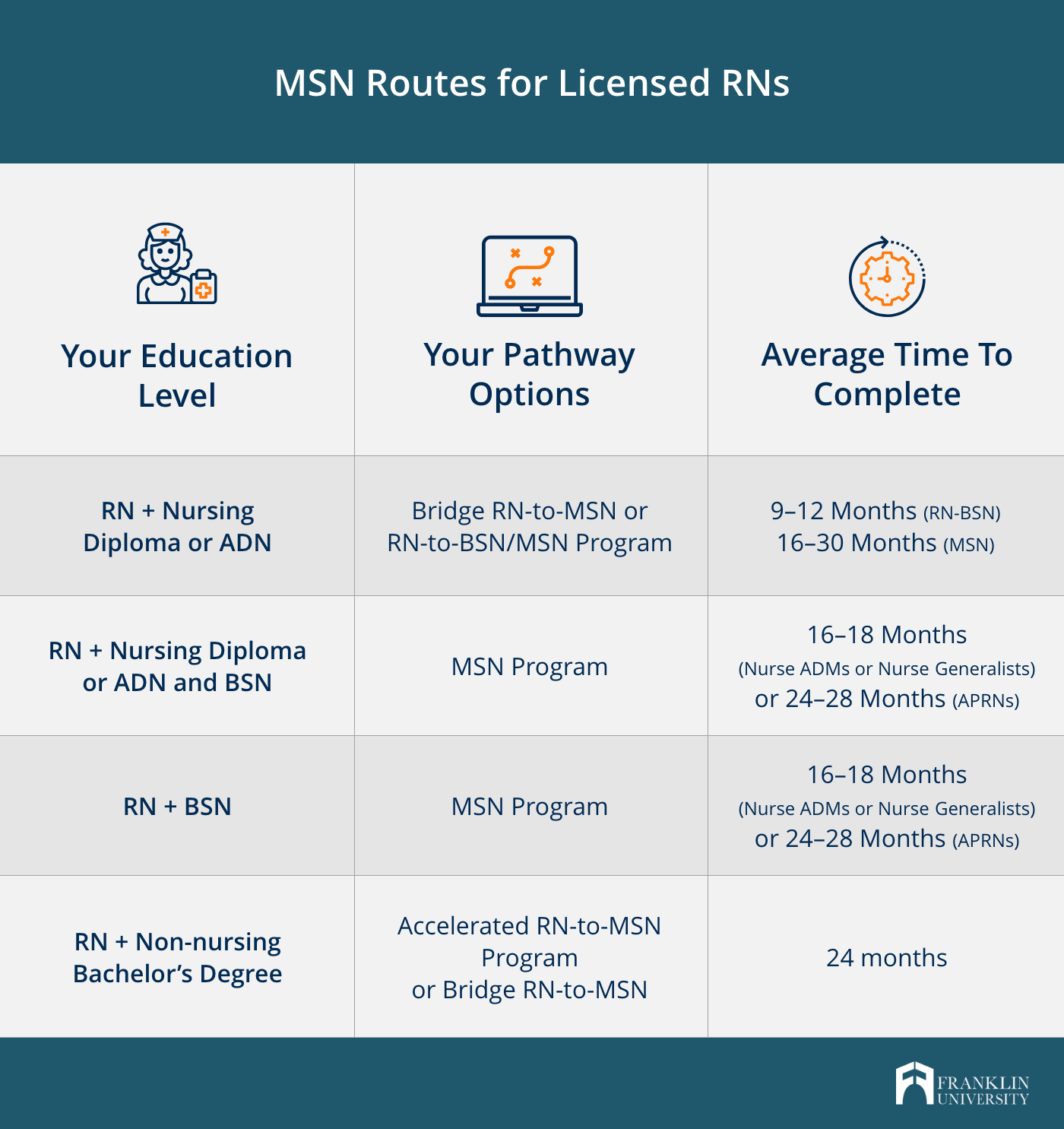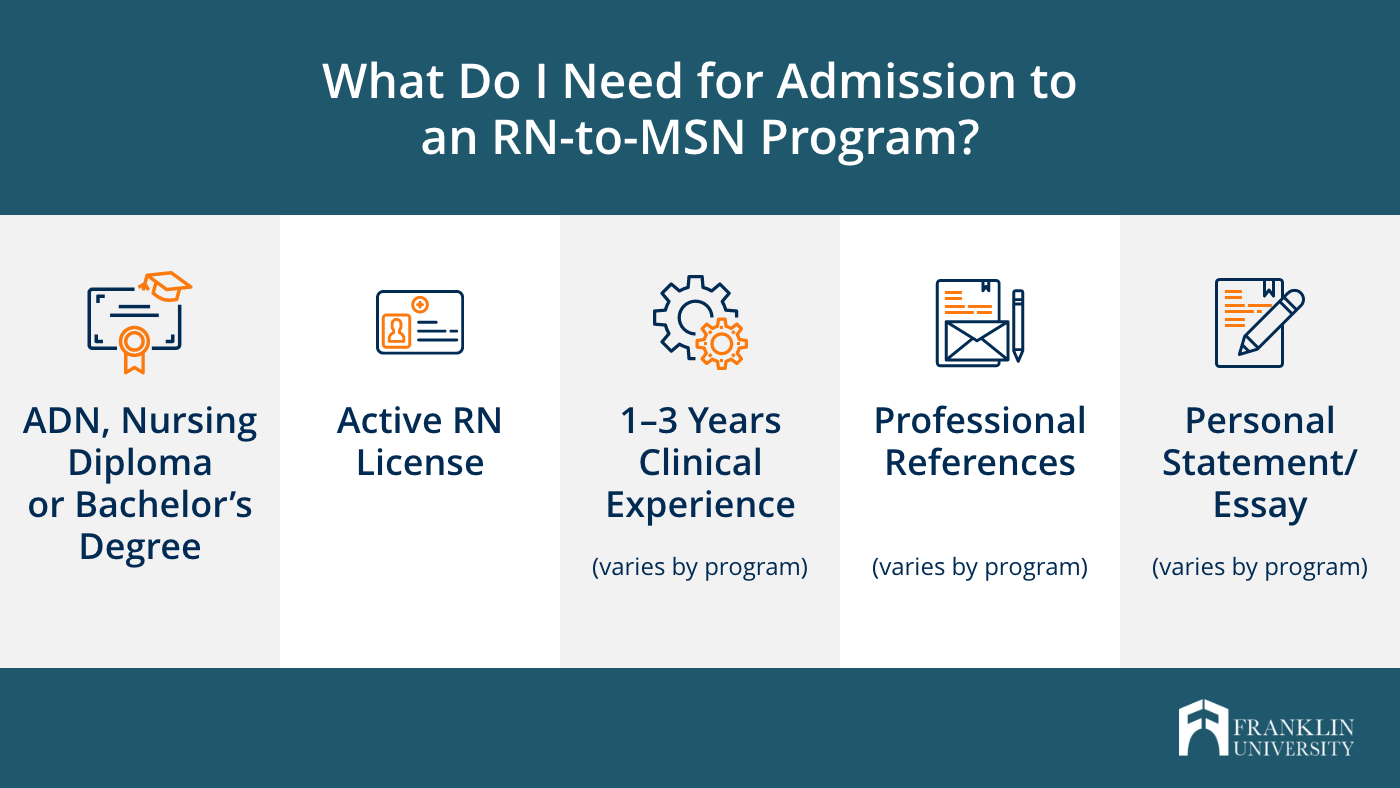Request Information
We're Sorry
There was an unexpected error with the form (your web browser was unable to retrieve some required data from our servers). This kind of error may occur if you have temporarily lost your internet connection. If you're able to verify that your internet connection is stable and the error persists, the Franklin University Help Desk is available to assist you at helpdesk@franklin.edu, 614.947.6682 (local), or 1.866.435.7006 (toll free).
Just a moment while we process your submission.

Can You Go Straight From an RN to an MSN? 6 Big Questions Answered
The healthcare industry has been undergoing unprecedented changes recently, and it’s only going to continue. The American Association of Medical Colleges (AAMC) estimates that the healthcare industry will see its workforce reduced by 120,000 employees by 2032.
This is one of the reasons that the United States Bureau of Labor Statistics predicts the number of available nursing jobs will grow 45% by 2030, which will also increase the need for nurses in leadership roles. Lightcast™ estimates that jobs for nurses who hold a Master of Science in Nursing (MSN) are projected to grow by 13.9% by 2031.
And that’s important because as a nurse, whether you want to continue providing direct patient care or move into an administrative role, you are going to need a master’s degree to rise through the healthcare ranks
If you’ve considered taking the next step in your nursing career, now may be an ideal time to pursue an MSN degree. The good news is that there are accessible university programs designed specifically for registered nurses (RNs) to do this.
1. Can I Go Straight From RN-to-MSN?
The short answer is yes, there are programs that allow registered RNs to move straight to an MSN. But the pathway will differ based on your level of education.
2. What are the Program Options for RN-to-MSN?

Get a FREE guide to help you advance your career, featuring helpful advice and thoughtful insights from nursing experts.
If you are an RN there are several different pathways you can take to add an MSN degree to your resume.
- Bridge RN-to-MSN Programs
Designed for working registered nurses who have a bachelor’s degree in non-nursing subjects or an associate degree in nursing (ADN). By taking part in a bridge program, an RN will have an opportunity to focus their studies and prepare for an MSN program without having to stair step across traditional degree programs.
- Accelerated RN-to-MSN Program
For registered nurses looking to earn their MSN faster than on-campus college programs. These can be strong programs for nurses who can step away from their job and focus on their studies full time.
- RN-BSN-to-MSN Program
For registered nurses looking to earn a bachelor’s and master’s in nursing degree. To do this efficiently, a BSN-to-MSN bridge program may be the preferred pathway.
3. What Do I Need for Admission to an RN-to-MSN Program?

In an effort to make sure that a student can survive (in an academic sense) the MSN program, a university will want every student to enter the program meeting certain qualifications including:
- GPA - Having a 3.0 GPA from your previous college degree level courses is a standard requirement for students coming into an RN-to-MSN program.
- Active license - An active RN license that is clear of any limitations.
- Experience - Some programs look for a minimum of 1-3 years of clinical experience from applicants. (Franklin University does not require work experience as part of the MSN application process.)
- References - Professional references go a long way toward helping people understand that you don’t just have the technical skills to pursue this degree but you have the mental and emotional ones as well.
- Essay - Many programs will want to hear why you decided to pursue your MSN at this point in your career and what you hope to achieve with it. (This is sometimes referred to as a Statement of Purpose.)
Remember that every program is different and while this list provides a baseline of expectations, you should carefully review the requirement details for each program you are considering applying to.
4. How Do RN-to-MSN Programs Work?
Jennifer Van Winkle, DNP candidate, MSN, ACNP-BC, FNP-BC and chair of the FNP, MSN-Generalist and MSN-Nurse Administration programs at Franklin University, says bridge coursework is a key component to the workings of RN to MSN programs.
“The RN-MSN option enables students to build upon an associate degree or nursing diploma with a 12-week bridge course that provides a pathway to an MSN degree. In the bridge courses, students learn the standards expected from a nurse as they relate to professionalism, research and theory to impact practice; leadership roles in quality improvement and information management; healthcare policy and regulation; and healthcare principles for individuals and groups and communities.”
RN-to-MSN Bridge. An entry point to many RN-to-MSN pathways is through a bridge program. Bridge programs let students take one, typically 12-hour, bridge course before they start their actual MSN curriculum. Bridge programs are a way for working nurses to build their knowledge and skill base in preparation for entering the MSN program.
RN to BSN/MSN. This is an ideal pathway for registered nurses looking to earn a bachelor’s and master’s in nursing degree. Typically a BSN is earned first and then an MSN is pursued.
Online MSN programs. Online degrees are typically the most popular route for RNs who have earned a BSN to earn their MSN. Whether nurses work day or night shifts, an online degree offers around-the-clock options that can work into their busy schedules.
Accelerated RN-to-MSN. These degree pathways are designed for RNs who don’t have a BSN. As part of the program, you’ll work with an advisor to create a curriculum path that gets you to graduation quickly.
5. How Long Does an RN-to-MSN Degree Take to Earn?
An RN-to-MSN degree track could take 16-28 months (following the completion of a bridge program).That includes class and clinical work. However the required time to be spent performing clinical and lab work will depend on the university you attend and your selected area of practice specialization. At Franklin University for example, RNs pursuing an MSN-FNP degree will need to have 16 lab hours and 600 practicum hours in order to graduate.
This article looks closer at the factors that can affect that timing.
6. Why Should I Go Straight from RN-to-MSN?
1. Career advancement
An MSN degree opens up your opportunities for career advancement. You can not only focus on the care and treatment of specific patient populations but you’ll also be able to look at nursing support careers such as research, management and education.
2. Job security
There is, and will continue to be, a need for RNs who hold an MSN. The U.S. Bureau of Labor Statistics predicts that in 2030 the need for nurses with an MSN will increase by 45% vs. the number of active MSN-credentialed nurses in 2020.
3. Increased earning potential
After earning an MSN, an RN will have the opportunity to pursue a higher base salary. That may happen in their current role or by moving into a new practice setting. The U.S. Bureau of Labor Statistics estimates that the average national salary for RNs is $77,605 while RNs with an MSN and at least 1-year of experience could make $92,760.
4. Providing focused care
By obtaining an MSN, the RN is open to more specialized care opportunities. For example, if an RN knows they want to eventually land in an Advanced Practice Registered Nurse (APRN) position an MSN is the only way to get there.
5. Autonomy
Each state has specific rules and regulations around how an RN can work with patients and administer care. RNs with an MSN have more autonomy in the types of treatment they can provide vs what a traditional RN can do. This even extends to where (i.e. working in a supervised clinic vs. having your own practice setting) they can provide that care.
Advance Your Career With an RN-to-MSN Program
An MSN offers a great opportunity to accelerate your career growth, take on leadership positions, and deliver better patient care. To be successful in your pursuit of this degree, you need to find an RN-to-MSN program that understands the importance of a work/life/school balance.
Franklin University provides accredited MSN programs that offer online coursework to help you manage your priorities. They offer leadership and APRN specializations with multiple pathways for earning your degree. In addition to Franklin's generous transfer credit policy and built-in clinical hours that save you time, Franklin keeps your MSN affordable with scholarships, special tuition rates and discounts through employers and professional organizations.
Explore Franklin’s RN-to-MSN program and find more ways you can elevate your patient care skills. And your career.





